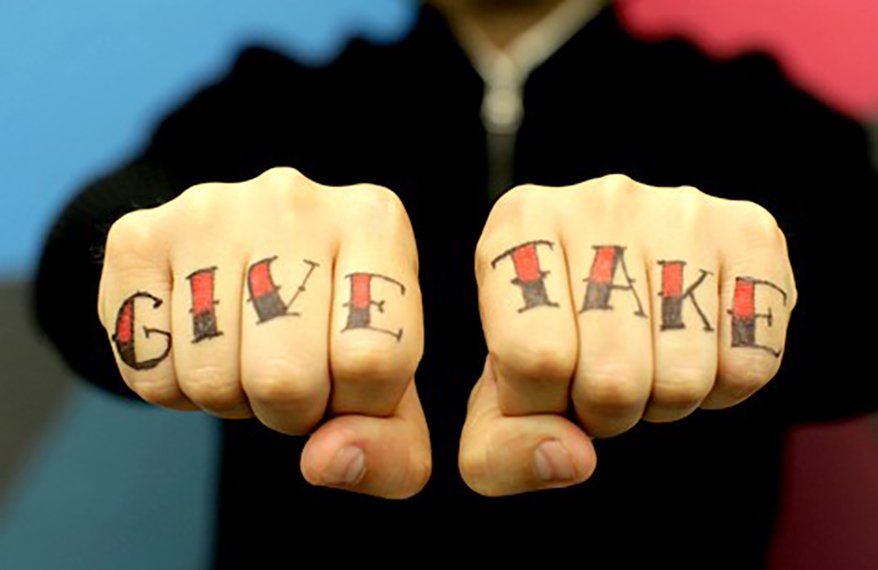
“The intelligent altruist, though less altruistic than the unintelligent altruist, will be fitter than both unintelligent altruists and selfish individuals.” Herbert Simon, Nobel Prize winner in economics
Give and Take: A Revolutionary Approach to Success, is a book by Adam Grant that is, in my opinion, one of the more important business books published over the last years. At least, it changed the way I see my professional and even personal relationships. Our success (or the lack of it) depends a lot how we deal with other people. The book tries to answer the following question:
“Should we try to “claim as much value as we can, or contribute value without worrying about what we receive in return?”
The author is a professor at the Wharton School of the University of Pennsylvania with a Ph.D. in organizational psychology from the University of Michigan. He is also a consultant and speaker for organizations like Google, Johnson and Johnson, the United Nations, and the U.S. Army.
The way we interact with other people can be divided in three types:
- Takers
- Givers
- Matchers
According to Adam Grant takers want “to get more than they give”. They view the word as zero-sum game – for them to win someone has to lose. The giver prefer “to give more than they get” and are “other-focused”. The author says that most us, at least in our professional life, are matchers witch strive “to preserve an equal balance of giving and getting” operating “on the principle of fairness”.
Which of the types tends to be more successful? Where are the givers tend to be on the success ladder? Dear reader, what is your opinion? Think for a few seconds.
If you think the givers tend to be on the bottom of the success ladder you are right according to Adam Grant. However, according with the same Adam Grant if you thinks the givers tend to be on the top of the success ladder you are right too. Matchers tend to be on second and takers on third.
But, of course, you can find exceptions that confirm the norm. As an example, Adam Grant argues that takers tend to be successful when they develop networks where people don’t exchange information about their behavior. Naturally, when people start to talk to each other about the behavior of takers their chances of success decrease – it is more difficult to find the next “sucker”. 🙂
In the following video, Adam Grant aims to give us an overview of his book, in an entertaining talk, where he uses an entire deck of playing cards.
Adam Grant defends that a certain type of givers build goodwill and trust that permit them to establish a great reputation and good relationships that enhance their success. Most people are matchers, as such, if they have the chance, they tend to reciprocate the behavior of the givers.
Of course, it takes time but a certain type of givers tends to build bigger and better networks of relationships.
What makes a giver successful in the long run?
Firstly, the giver has to find some meaning in what it gives. If he doesn’t find a meaning he tends to burnout. One thing that helps the giver to persist in giving is seeing some progress in the person he is trying to help. One possible example, is a high-school teacher that see his students go to good universities.
Secondly, the successful giver tends to have a high concern towards his self-interest and the interests of others. The successful giver mixes his self-interest with the interests of others, in all his actions of his daily life.
Successful givers tend to concentrate the acts of giving in the areas that they have more interests. In other words, they don’t “shoot” in any direction. Other behaviors of successful givers are related with the existence of takers. Takers, if they have the chance, will abuse of givers. Success givers give many times without strings attached but they don’t like to be abused, as such, they take measures to minimize that problem.
One typical behavior is to give (time, information, etc) in a limited way to people they know. They tend to start relations with new acquaintances with the “right foot” even if they know nothing about the person. Then, after they know the person a little better, they will invest more.
Many of the successful givers are very good at spotting takers. According to Adam Grant, takers tend to have particular characteristics. They tend to treat very “well” hierarchical superiors and very badly people in lower positions. Plus, they tend to speak in a way that they appropriates the merits of others – they exaggerate a lot their contribution and forget the contribution of others. They speak often “I did that…” even if many others person were also involved.
The message of this book is important and it is well written. However, it has one or two flaws. The book gives the reader some good advices. However, I think it could be presented in a more practical way.
It is worth the effort of reading it. But I think also the book is too long. Personally, I would like less stories and a more direct approach.
Ivo Dias de Sousa is a Portuguese writer born in Mozambique. Ivo is also a Professor at Universidade Aberta, Portugal, giving courses on information management. Currently, Ivo is interested in using his experience on information management to construct applications (see http://windit-app.com/ ) for smartphones, in collaboration with others. Ivo holds a Master in Statistics and Information Management (Universidade Nova de Lisboa) and a Ph.D. in Information Management (Universidade Aberta). Amongst his main interests are information management, psychology of luck and literature.









